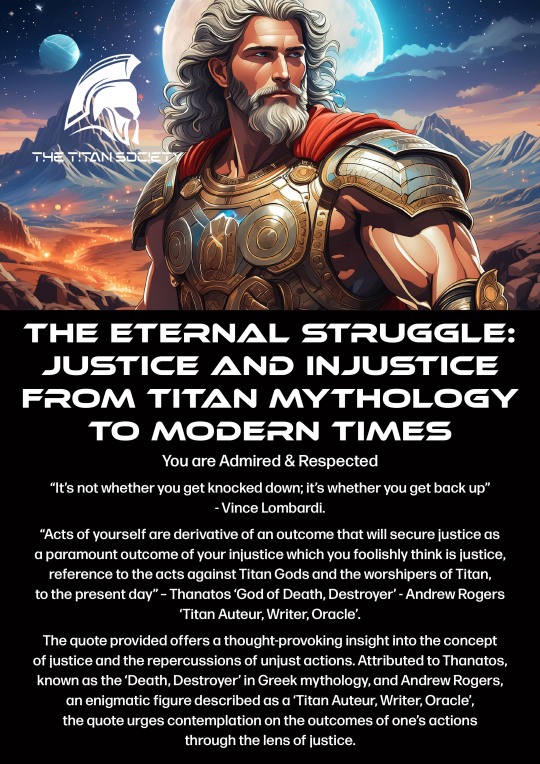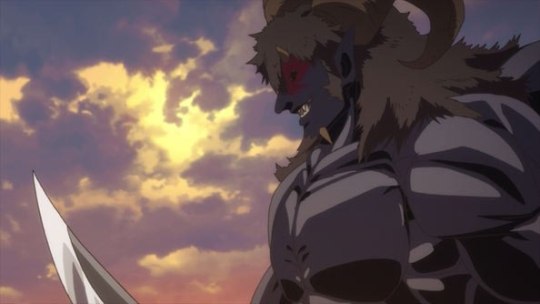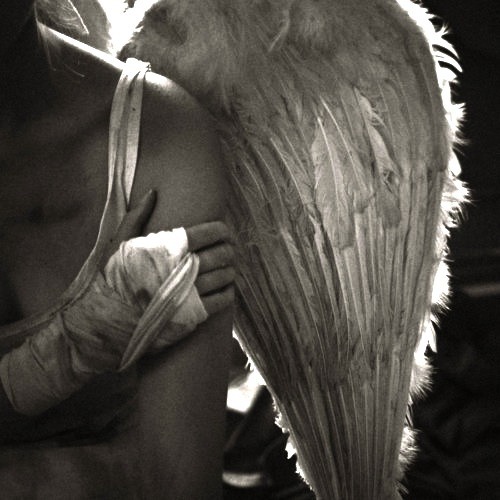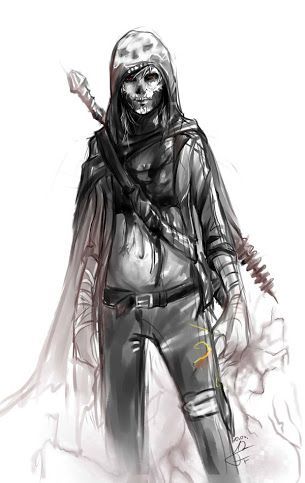#thanatus god
Explore tagged Tumblr posts
Text
Greek Gods 101: Thanatus
Thanatus is a Daimon of non-violent death. Excluding the universal offerings, some common offerings include:
Sleep-Inducing Herbs or Drinks
Black or White Flowers (Roses Especially)
Black Coffee
Bread
Poppies or Poppy Seeds
Depictions of Butterflies
Depictions of Swords and Other Weapons
For devotional acts, some activities that can be done for him include:
Visit Cemeteries
Learn About the Pre-, Peri-, and Post-Death Process and Practices
Learn About Death in Different Cultures
Learn About Butterflies and Other Natural Cycles
Learn About the Stages of Grief
Embrace Aging
He is not celebrated in any Athenian holidays.
#thanatus#thanatus deity#thanatus god#thanatos#thanatos deity#thanatos god#deities#hellenism#helpol#hellenic#hellenic pagan#hellenic polytheism#hellenic community#hellenic polytheist#hellenic deities
156 notes
·
View notes
Text
Just realized I have a Greek mythology account and only talk about Ares frequently, and I’m pretty sure you guys don’t even know I have another favorite 😅
____________________________________________
I’ve always been extremely fascinated with the idea of death. To me, for some strange morbid reason,I find the idea of passing away intriguing and comforting. I’m not suicidal or anything, I’m not actively trying to die. It’s just, if I died right now, I would be at peace with that.
I think that why when I got into Greek mythology (like actually, not my dreaded middle school PJO phase) I was drawn towards a lot of the chthonic gods. At first, I was kind of one of the Hades obsessed ‘He can do nothing wrong!’ people. Then, I actually read more sources and realized he isn’t the coolest. Don’t get me wrong, I still like Hades, he’s just not my favorite anymore.
Then, I stumbled upon Thanatos (or Thanatus, depends on how you spell it :>) And It was practically love at first Theoi.com reading.
Then, like a year later, I learned about Hades, I play it now. Love that Thanatos aswell. But, I know that myth Thanatos and media portrayals of Thanatos are very different.
Also I CAN’T FIND ANY MYTHS WITH HIM 😭😭 ALL I HAVE IS SISYPHUS AND THAT ONE PART OF THE ILLIAD! If you guys have any myths, or better sources than Theoi.com, I’ll accept them gratefully.
Anyways, I’ve loved Thanatos for about 2 years and no one knew. I know almost nothing about him, due to the fact I’m a newcomer to Greek mythology, but I love him anyways.
Expect more Thanatos content :D
#greek mythology#Thanatos Greek mythology#thanatos#thanatos deity#greek myths#I need more sources#and sleep#Hypnos doesn’t love me 😞#greek myth memes#ares#ares greek god#figured I’d throw in some more popular tags
36 notes
·
View notes
Text

BASICS
FULL NAME: THANATOS
» MEANING: Thanatos [ In Greek mythology, Thanatos (/ˈθænətɒs/;[3] Ancient Greek: Θάνατος, pronounced in Ancient Greek: [tʰánatos] "Death",[4] from θνῄσκω thnēskō "(I) die, am dying"[5][6]) was the personification of death. He was a minor figure in Greek mythology, often referred to but rarely appearing in person. His name is transliterated in Latin as Thanatus, but his counterpart in Roman mythology is Mors or Letum. ]
VERSE: How To Kill A King; Night Shift, The Meaning of Forever.
OTHER NAMES: He likes the name Malak so he's been using it walking around the human realm.
AGE: Undetermined; it varies in human form, he appears to be in his late 20'a, 30's.
DATE OF BIRTH: It is hard to pinpoint when Thanatos was born, but his birth was likely prior to the Titanomachy. After all, Cronus ruled during the Golden Age of Man, where men knew no hardship and always died peacefully in their sleep. While this is a prime example of Hypnos-Thanatos teamwork, the root of death may have been more multifaceted at the time.
PLACE OF BIRTH: Underworld.
SPECIES: God.
POWERS
What is Thanatos the God Of?
Thanatos is the Greek god of peaceful death and a psychopomp. More specifically, Thanatos can be explained away as the ancient Greek personification of death. His was a death most ideal. Legends state that Thanatos would manifest before mortals in their final hour and, with a gentle touch akin to that of Hypnos, end their life.
It is important to understand that Thanatos acted on command by the Fates, restricted by the destiny of one’s life. He was unable to act on his own accord, nor was he able to violate destiny and decide when an individual’s time was up.
To do his duty, Thanatos had to have impeccable timing and nerves of steel. He was not a faint-hearted god. Moreover, Thanatos was strict. In the opening discussion of Eurpides’ tragedy, Alcestis, Apollo accuses Thanatos of being “hateful to men and a horror to the gods” after he refused to delay someone’s hour of death.
Thanatos’ response?
“You cannot always have more than your due.”
OCCUPATION: As the personification of Death, Thanatos works under Hades' command and carries humans off to the Underworld once the time allotted to them by the Fates has expired. Thanatos igod or personified spirit (daimon) of non-violent death. His touch was gentle, likened to that of his twin brother Hypnos (Sleep). Violent death was the domain of Thanatos' blood-craving sisters, the Keres, spirits of slaughter and disease.
GENDER: Cisgender Male.
PERSONALITY
Functions and Characteristics
Thanatos was the Greek god or daemon who personified death. A deity without a cult, he was usually met with dread or even hatred. The poet Hesiod described him as having
a heart of iron, and his spirit within him is pitiless as bronze: whomever of men he has once seized he holds fast: and he is hateful even to the deathless gods.[2]
Ever relentless, Thanatos always claimed his prize in the end. He could not be swayed by gifts or speeches.[3]
Occasionally, Thanatos was viewed in a more optimistic light, as a gentle liberator and giver of eternal sleep to weary souls.[4]
Thanatos lived together with his twin brother Hypnos (“Sleep”) beyond the edge of the earth, in the murky Underworld home of their mother Nyx (“Night”).
In literature and art, Thanatos was sometimes represented carrying away the deceased or bringing them to the Underworld. But his exact purpose and function is unclear, as it was more often the god Hermes who was considered responsible for bringing souls to the Underworld, while Hades was the ruler of the dead. Thanatos seems to have been above all a symbolic entity, representing the inexorable approach of death.
Thanatos is indiscriminate, merciless, gentle, determined.
APPEARANCE
Thanatos is often shown carrying an inverted torch (holding it upside down in his hands), representing a life extinguished. He is usually described as winged and with a sword sheathed at his belt. In Euripides' Alcestis (438 BCE), he is depicted dressed in black and carrying a sword. Thanatos is lean and muscular, with a regal face, honey gold eyes, and black hair flowing down his shoulders.
FACE CLAIM: Yoo Ah-in.
HEIGHT: 6'2 [187.96 cm.]
WEIGHT: 205 lbs. [93 kg.]
BUILD: Lean, muscular.
GAIT:
HAIR COLOR: Black.
EYE COLOR: Honey, gold eyesl.
BIRTHMARK: Some.
OVERVIEW: » SCARS: »
TATTOOS: YES. To be added.
BACKGROUND
HOMETOWN: The Underworld.
RESIDENCE: The Underworld.
NATIONALITY: N/A.
ETHNICITY: N/A.
FINANCIAL STATUS: He's got money..
DEGREE: Degree in he'll come for you and you won't be able to do anything about it.
SPOKEN LANGUAGES: He can speak any language.
RELATIONSHIPS
PARENTS & SIBLINGS: The Greek poet Hesiod established in his Theogony that Thánatos has no father, but is the son of Nyx (Night) and brother of Hypnos (Sleep).
CHILDREN:
PETS:
SIGNIFICANT RELATIONSHIPS: » Hades, Persephone, Hypnos, Fates, and Eoduun.
What Was Thanatos’ Relationship with Other Gods?
Since interaction between Thanatos and other deities is scarce, his relationship with each is up to interpretation. He likely kept them at arm’s length, save for his twin, parents, and a select number of his other siblings. This would include the Moirai, or the Fates, as he relied on their control over man’s destiny to know when he should intervene with his… services. As an Underworld resident and directly handling the death of mortals, it is likely that Thanatos interacted largely with Hades and other members of his retinue. The Judges of the Dead, Charon, and the many water gods that inhabited the rivers of the Underworld would all be familiar to Thanatos. Furthermore, Thanatos likely had extensive interaction with Hermes, who acted as a psychopomp leading the souls of the dead to the Underworld.
Is Thanatos Related to Hades?
In a complicated sense, Thanatos is related to Hades. All Greek gods and goddesses are somehow related to one another, and Thanatos and Hades are no different. They are 1st cousins once removed.
Nyx is Gaia’s sister and since Gaia bore the 12 Titans, Nyx is Hades’ great aunt. Due to this relation, the Titans are also Thanatos’ 1st cousins. Since there is a generation separating Thanatos from Hades, he becomes his 1st cousin once removed.
The relationship between Hades and Thanatos has been misunderstood in the past. They have been mistakenly identified as father-son, with the King of the Underworld in the parental role. Another common misunderstanding is that Thanatos is an aspect of Hades, or vice-versa. This is not the case.
They are two completely separate deities who, by virtue of their connected realms, have a working relationship.
HISTORY: Thanatos, in ancient Greek religion and mythology, the personification of death. Thanatos was the son of Nyx, the goddess of night, and the brother of Hypnos, the god of sleep. He appeared to humans to carry them off to the underworld when the time allotted to them by the Fates had expired. Thanatos was once defeated by the warrior Heracles, who wrestled him to save the life of Alcestis, the wife of Admetus, and he was tricked by Sisyphus, the king of Corinth, who wanted a second chance at life.
Why is Thanatos the God of Death?
There is no real rhyme or reason as to why Thanatos became the god of death. He was simply born into the role. If we follow the trend of newer generations of gods replacing older ones, it could be argued that Thanatos – and his realm – are no different.
It is hard to pinpoint when Thanatos was born, but his birth was likely prior to the Titanomachy. After all, Cronus ruled during the Golden Age of Man, where men knew no hardship and always died peacefully in their sleep. While this is a prime example of Hypnos-Thanatos teamwork, the root of death may have been more multifaceted at the time.
In Greek mythology, Iapetus was the Titan god of mortality. Coincidentally, he was also the stubborn father of the mighty Atlas, the cunning Prometheus, the forgetful Epimetheus, and the foolhardy Menoetius.
Since mortality is a huge realm afflicted by various human conditions and external forces, it is likely Iapetus’ role was divided amongst a handful of other beings. Other divinities that could have inherited aspects of Iapetus’ realm include Geras (Old Age) and the spirits of brutal death, the Keres.
ROMANTIC HISTORY: NADA...
Who is Thanatos in Love With?
Being the god of death is demanding and depressing. As is the tendency for Chthonic gods and Underworld denizens, duty came before romance. Most do not have established affairs let alone marriages. In the rarity that they did settle down, they were strictly monogamous.
As a result, there is no record of Thanatos having love interests or offspring. More modern “ships” have tied the god to Makaria, a daughter of Hades and Persephone and the goddess of blessed death, but again, there is no evidence of this outside of people’s flights of fancy.
PLATONIC RELATIONSHIPS: Hades, his boss.
THOUGHTS ON LOVE: ...
HEALTH
PHOBIA(S): None.
HANDICAP(S): None.
MENTAL DISEASE(S): Depression...
PHYSICAL DISEASE(S): None.
PREDISPOSITION(S): None.
4 notes
·
View notes
Text
The Eternal Struggle: Justice and Injustice from Titan Mythology to Modern Times

The Eternal Struggle: Justice and Injustice from Titan Mythology to Modern Times
You are Admired & Respected
“It's not whether you get knocked down; it's whether you get back up” - Vince Lombardi.
“Acts of yourself are derivative of an outcome that will secure justice as a paramount outcome of your injustice which you foolishly think is justice, reference to the acts against Titan Gods and the worshipers of Titan, to the present day” – Thanatos ‘God of Death, Destroyer’ - Andrew Rogers ‘Titan Auteur, Writer, Oracle’.
The Consequences of Injustice: A Reflection on Ancient Mythology
The quote provided offers a thought-provoking insight into the concept of justice and the repercussions of unjust actions. Attributed to Thanatos, known as the 'Death, Destroyer' in Greek mythology, and Andrew Rogers, an enigmatic figure described as a 'Titan Auteur, Writer, Oracle', the quote urges contemplation on the outcomes of one's actions through the lens of justice.
The reference to "Acts of yourself" alludes to individual behaviors and choices, implying a direct connection between personal actions and subsequent consequences. Furthermore, the notion of these acts being "derivative of an outcome" underscores the cause-and-effect aspect of justice, suggesting that one's actions will inevitably lead to specific results.
The mention of "Titan Gods and the worshipers of Titan" invokes ancient mythology, specifically the conflict between people against the Titans. This reference adds a mythical and timeless dimension to the discourse on justice, as it draws upon ancient tales of power struggles and divine retribution.
Although cryptic in nature, the quote appears to caution against misconceptions of justice, as it highlights the folly of mistaking unjust acts for righteousness. This warning is encapsulated in the phrase "which you foolishly think is justice", emphasizing the danger of conflating one's own skewed perception of justice with genuine moral rectitude.
By invoking "the present day", the quote seeks to underscore the enduring relevance of these themes. It prompts reflection on how the dynamics of justice and injustice continue to shape human affairs, echoing the timeless nature of ethical dilemmas and their far-reaching implications.
In summary, the provided quote, attributed to the mythical figure Thanatos and the enigmatic Andrew Rogers, serves as a philosophical contemplation on the consequences of individual actions and the enduring significance of justice. It invites readers to ponder the timeless interplay between personal choices, justice, and the enduring impact of these dynamics on human existence.
Thanatos in Greek Mythology
In Greek mythology, Thanatos holds a significant role as the personification of death. Unlike many other figures in Greek mythology, Thanatos is often mentioned but seldom depicted in person. His name is transliterated as Thanatus in Latin, while his equivalent in Roman mythology is Mors or Letum. Thanatos represents an intriguing and essential aspect of both Greek and Roman mythologies, embodying the concept of mortality and the passage to the afterlife.
See attached.
All images, text, design, and art license owner Andrew Rogers©.
Andrew Rogers
Founder, Titan Auteur, Creative Director, Consultant, Writer, Oracle
The Titan Society
Zoom: [email protected]
Skype: live:.cid.b44175dd49cbc084
#titan#inspiration#motivation#creative#destroyer#imajica#multiverse#psychic#quotes#warlock#Thanatos#Death#Aftterlife#Mythology#GreekMythology#AncientGreek#UranusWisdom#TitanIntellect#OracleMind#EarthRealm#TheTitanSociety#ThePrimordialSociety#AndrewRogers#CurrentAgendas#AwarenessOfEarth#WisdomInAction#Hellene#Hellenic#Motivation#Inspiration
0 notes
Note
😤 for a random angsty scene — @xoteajays
I've been thinking about my Star Wars ships, so sorry in advance, but you're getting some Thanatus/Luke nonscenes.
"Don't you even care?" Luke turned to see Thanatus staring down at him from the top of the steps. "You're leading innocent people in danger."
"They're a part of this now, Thanatus," Luke told him. "We can't just ignore it."
Thanatus didn't say anything for a moment. He just gave Luke a stern look. "Like you ignored my warnings about Kylo Ren?"
"This isn't about-"
"Don't play stupid," Thanatus narrowed his eyes. "We both know you're better than that."
The potential for a lukatus ex-husbands arc during the sequels in unlimited. Like sure they would eventually work it out, but god the in-between would be wild.
Send me an emoji to get a scene
1 note
·
View note
Text
Thanatos Information

Thanatos / Thanatus - Θανατος Roman: Mors, Letum* ------ Thanatos is the god of non-violent death. He's also referred to a daimon, or the personified spirit of. ------ Although Thanatos and his domain is referred to many times in myths, he rarely makes an appearance in person. Similarly, he has a much smaller following compared to the other gods, as the Greeks did not wish to invite Death into their home. ------ Even despite this, there are a few things known about Thanatos. - Appearance: He is usually depicted as a beareded, older man. In some depictions, he's a beardless youth, but this is unusual. He carries a sword, and will be seen with his brother (Hypnos), the Fates, or Keres. Family: His mother is Nyx, and he is typically depicted as fatherless. One source lists his father as Erebos. His brother is Hypnos, and the two are often mistaken for each other. Epithets: Thanatos has no known epithets. He is referred to as 'Death' in most works. Cults: He has no known temples or cults, but he was offered sacrifices sometimes. The city of Gadeira is said to have sung hymns in his honour. ------ Possible Offerings Little is known about what offerings people gave Thanatos. It was very likely he was given the same basic offerings other gods have been given. There are also mentions of Thanatos having no offerings, as the people did not believe offerings would sway his opinion as an unbiased god. (Aeschylus, Fragment 82 Niobe + Aristophanes, Birds 1360) This list will remain specific to those offerings, and other mentions within Thanatos' mythos, but you're free to add your own findings as well! - Lock of hair (From Alcestis of Euripides, in which he cuts off a lock of a dying person's hair and devotes it to the Underworld) - Meat (Cows, Goats, and Sheep were common, so things such as steak or mutton would work for modern worship. Fish is also common in seaside places.) - Wine - Milk - Honey - Oil - Water - Fruit Hymns: Orphic Hymn 87 to Thanatus Myths Featuring Thanatos: Thanatos and Sisyphus Thanatos and Heracles (Heracles wrestled Thanatos to save Alcestis.) Thanatos and Sarpedon (He was sent to retrieve Sarpedon's body.) *Letum is less common than Mors, but still used. Sources + Further Reading: Thanatos | Wiki | 2 | 3 | 4 | 5 | 6 | Offerings | Photo List of Worshippers - Sorted Alphabetically @dxllxfxce @comradewitch @godlysuggests @ohdeardeath @tyme2explore @vanillespirit
#Greek God Worship#greek gods#thanatos#thanatos*#thanatos worship#thanatos deity#thanatos worshipper#thanatus#thanatus*#death god#god worship#hellenic polytheism#hellenic polytheist#dodekatheism#dodekatheist#hellenistic
57 notes
·
View notes
Text
Greek Gods AU feat. Fairy Tail
this is something I thought was fun to think about when I had the time a couple of weeks ago. @rougescribe also helped me with this - she knows a lot about these subjects!! ❤
Natsu: Helios
Lucy: Alectrona/Astraea/Asteria
Erza: Eos/Nemesis/Nike/Artemis/Bia
Gray: Themis/Alastor/Khione
Wendy: Aiolos/Asklepios/Boreas
Jellal: Aether/Atlas/Crios/Uranus
Laxus: Zeus
Freed: Erebos
Bixlow: Hecate/Hermes
Evergreen: Chloris/Pan/Antheia
Mirajane: Aphrodite
Lisanna: Hebe/Tyche
Elfman: Priapus/Aristaeus/Cybele/Heracles
Juvia: Amphitrite/Doris/Leukothea
Gajeel: Hephaistos
Levy: Athene/Metis
Cana: Artemis/Tyche
Gildarts: Kratos
Kagura: Alekto
Zeref: Hades
Mavis: Phersephone
Rufus: Momus
Ultear: Chronos
Sting: Hyperion/Apollon
Midnight: Hypnos
Rogue: Nyx
Minerva: Nemesis
Hisui: Plutus
Mard Geer: Thanatus
Bacchus: Dyonisus
Sorano: Peitha
Yukino: Morpheus/Harmonia
Jura: Poseidon
Larcade: Apollon/Hyperion
Most of these are power based - I feel that it would be too difficult to capture power, personality AND relationships for the characters all at once. For example, Zeus is quite obviously the power Laxus would use but Zeus’ personality and relationships don’t exactly suit him lmao.
Obviously, as for ships, I’d also go for Freed x Laxus and it’s nearly impossible to make that all match if we consider everything about the Greek Gods lore lmao.
Anyway- feel free to use this or share your headcanons and your ideas and everything!! This is just a really really rough idea <3 Maybe I’ll make some aesthetics some time or something 🤔
#fairy tail#natsu dragneel#lucy heartfilia#erza scarlet#gray fullbuster#wendy marvell#jellal fernandes#laxus dreyar#freed justine#evergreen (ft)#bixlow#mirajane strauss#lisanna strauss#elfman strauss#juvia lockser#gajeel redfox#levy mcgarden#cana alberona#gildarts clive#kagura mikazuchi#zeref dragneel#mavis vermillion#rufus lore#ultear milkovich#sting eucliffe#midnight (ft)#macbeth (ft)#rogue cheney#minerva orland#hisui e. fiore
69 notes
·
View notes
Note
‘ it’s not murder if they deserved it, right? ’

@sunbruise requests an answer for the GROWLING.

DEATH APPROACHES . — was it THANATOS or THANATUS the romans named him? ( he doesn’t remember , doesn’t care. the romans and the greeks are deliciously intertwined like branches on a misshapen willow. ) still, the SON OF APOLLO asks him such a benevolent question that an amused expression pulls itself onto his features. they are sharp and angular, like the greeks and the romans, and tanned skin seems simultaneously ancient and ageless.
‘ regardless of what you decide to call it, ’ thanatos snorts, his finger hooking through the air to collect the thread of the poor, unfortunate son of a bitch who decided to wrongfully cross KENNETH VARECK . if the demigod were to look hard enough, he would be able to see the way the spiritual essence bends to the death god’s will, the way he takes his knife to the air to bring about the end as though it was a surgical procedure. thanatos’ empty hand clenches, and when his palm flexes again, a butterfly sits in the center of his palm, glowing with a gentle violet light. it crawls onto his lapel and seems content, albeit thanatos notices that it moves to hide behind his neck as death looks at the roman once more. ‘ i call it overtime. i hope that whatever this poor... ’
( he steps over the corpse. messy things, mortals. )
‘ ... soul did to you, it was worth it. ’
#sunbruise#» ic.#» answered.#» modern verse.#» queue.#( hi i hope this is okay!! i LOVE your oc he's FANTASTIC!! )
3 notes
·
View notes
Text
Spirits
Daemones (personified spirits) of the human condition and abstract concepts formed a large part of the Greek pantheon of gods. Their names are simply capitalized nouns so, for example, Eros is "Love" and Thanatus is "Death".

“The abstract personifications can be divided into seven broad categories:
1. Emotions and states of mind, e.g. Love and Hate, Sexual-Desire, Affection, Anger, Harmony and Discord, Joy and Grief, Laughter, Hope and Fear, Indignation, Delusion;
2. The human condition, e.g. Birth and Death, Sleep and Dreams, Pleasure and Pain, Youth and Old Age, Wealth and Poverty, Hunger and Disease, Ease and Toil, Fate and Opportunity;
3. Qualities, e.g. Strength, Beauty and Grace, Wisdom, Stupidity;
4. Morality, e.g. Valour, Modesty, Moderation, Hubris, Mercy, Truth, Lies, Impiety, Justice, Oath, Respect, Insolence;
5. Voice, e.g. Eloquence, Persuasion, Criticism, Lies, Quarrels, Prayer, Counsel, Curse, Lament, Rumour, Message, Fame, Battle-Cry;
6. Actions, e.g. Force, Rivalry, Victory, Labor, Contest, Fighting, Murder;
7. State of society, e.g. Peace and War, Good-Governance, Law and Lawlessness, Justice and Injustice.”

“Most of these divinities were pure personification with little or no mythology. Only a handful achieved full characterisation, including Eris (Strife) and Hypnus (Sleep). A few including Eros (Love), Nike (Victory) and Nemesis (Indignation) achieved cult status, with minor altars and precincts dedicated to them in historical times.
The first section of this page lists the Spirits (or Daemones) by their Greek names, the second gives their Latin counterparts. After each there follows an English translation of the name-word. In many cases multiple terms are used to clarify the meaning of the word, especially moral concepts which do not translate easily.”

Spirits unlike demons are mostly personifications of things seen in day to day life. Most of them are either some sort of family / household patreons or guardians of nature, leading to a lot of spirits being mostly found in watery and foresty environements. Spirits tend to get divided into two categories friendly and malicious spirits. Friendly spirits are rather passive in nature and wont interact with humans unless aggrevated or threatened. Unfriendly spirits are mosty known to cause mischief or even haunt certain households. Spirits are also associated with ghost and the dead, being described as a soul of the deceased person wandering the Earth seeking a way to afterlife.
https://www.theoi.com/greek-mythology/personifications.html
2 notes
·
View notes
Text
Pokémon Sword & Shield: About that Last Legendary
This is something that’s been on my mind for a while. Also, SPOILERS FOR MAIN STORY. YOU’VE BEEN WARNED.
About that fucker Eternatus? Yeah. I got a lot to say about it.
Its English name is a mixture of eternal, aeternatus (Latin for immortalized), and Thanatus (Latin transliteration of Thanatos). Thanatos happens to be the God of Death in Greek Mythology. This is also nodded to in that the bastard looks like a skeleton dragon.
As for it’s Japanese name, Mugendaina, is a combo of mugendai (infinity) and Daimax, or dynamic. We all know what that last part is for, but when I think infinity, I think infinite power.
It’s also worth mentioning that in its Eternamax form, it’s the tallest Pokémon in the history of ever; 328 ft. 0.1 in. (100 m). Yeah. That’s tall. That form can also rip through spacetime in a massive storm, and its power can prevent Pokémon from acting/moving as it stores energy. Not even Arceus, the literal creator of the universe/omniverse, can do that.
Then again, the Arceus we always see might just be one of the thousand arms the actual Arceus has, but that’s a conversation for another time.
Speaking of Arceus, that guy created the God of Time and the God of Space, right? And probably the Lake Trio (whom I consider gods/deities of Willpower, Emotion, & Knowledge), and the Pokémon equivalent of Lucifer/Satan, who’s basically the god of basically hell.
Who’s to say he didn’t create a God of Death?
Think about it. 3000 years prior to game events, that Eternatus fucker caused the Darkest Day, nearly destroying the region and was only stopped by two heroes wielding a sword and a shield. But they didn’t kill the thing so it wouldn’t cause trouble ever again; they sealed it away. And when you and Hop fight it, you have to capture it; you can’t straight up destroy it.
You can’t truly kill a god, after all. (I know about the Arceus movie, but like I said, one of the thousand arms, not actually Arceus).
Now keep in mind, Eternatus is an extraterrestrial Pokémon, having fallen to the planet via a meteor 20000 years ago. So while it’s very much an alien, this doesn’t say “god,” does it? I get that.
But then there’s the Extradimensional Pokémon, the group the gods are a part of. Recall that’s where a majority of the Gen 7 Legendries came from, two of which basically being the gods of the Sun and Moon. One more being a different dimensions’ God of Light, exclusive to that world. So it’s not out of the possibility that Eternatus may be a god, in particular the God of Death.
Now, when people think death, people think Ghost or Dark-type. But I counter that with being if there was a god of the dead.
A God of the Dead would be like a groundskeeper, an undertaker, a mortician; someone who watches over the dead. While a God of Death would basically be the reason why there’s any dead at all.
Which makes Eternatus’ type all the more reasonable. It’s primary type is Poison, secondary Dragon. Dragon’s are deadly, but combine a hostile, deadly dragon with poison breath or toxic claws and fangs. No way you’ll survive that shit alone.
But then there’s another snag; Yveltal. That’s basically a God of Death too. But then there’s Eternatus being from out of the world, maybe out of the dimension.
And one more thing, now that we’re on Gen 6 as well...
Anyone else notice that particular 3000 year thing with the Darkest Day? Doesn’t that sound familiar?
Could the Darkest Day have been limited to Galar? Or was it worldwide?
I guess, I have an idea that Eternatus may be a God of Death, whether of our world or another, but...
It could’ve been the cause of the Great War 3000 years ago. The one with the Ultimate Weapon, with AZ, that resulted with Mega Evolution being created.
I dunno, maybe that’s a stretch.
My point is, Eternatus is a bitchass motherfucker.
12 notes
·
View notes
Text
Legendary and Mythical Pokemon basis
Arcticuno: Coming of Winter
Zapdos: Summer storms
Moltres: Coming of Spring
Mew: Ancestor
Mewtwo: Cloning from genetic material
Raikou: Thunder
Entei: Volcanoes
Suicune: Winds
Ho-oh: Rainbows and the sky
Lugia: Storms and the sea
Celebi: Time travel
Regirock: Stone Age
Regice: Ice Age
Registeel: Iron Age
Latias and Latios: Genders
Groudon: Land
Kyogre: Sea
Rayquaza: Sky
Jirachi: Wishes
Deoxys: DNA
Uxie: Knowledge
Mespirit: Emotion
Azelf: Bravery
Dialga: Time
Palkia: Space
Giratina: Matter
Regigigas: Supercontients (Representing a time when all of Earth’s landmasses were merged together)
Heatran: Earth’s core (Fire/Steel Typing)
Cresselia: Dreams and Full Moon
Darkrai: Nightmares and New Moon
Manaphy: Sea nymphs
Phione: Sea nymphs
Shaymin: Flowers
Arceus: Creation
Victini: Victory
Reshiram: Yang
Zekrom: Yin
Kyruem: Wuji
Cobalion, Terrakion and Virizion: Three Musketeers/ swordsmen
Tornadus: Tornadoes
Thundurus: Lightning
Landorus: Fertility (Land is also associated with fertility in ancient mythologies)
Keldeo: D’Artagan (The fourth member of the Musketeers)
Meloetta: Muse (Specifically Euterpe, the Muse of music, and Terpsichore, the Muse of Dance; both are from Greek Mythology)
Genesect: Ancient insects/ genetic modification
Xerneas: Life
Yvetal: Death
Zygarde: Order
Diancie: Carbuncle (A mythical fairy-like creature who wears a jewel on it’s head)
Hoopa: Genie
Volcanion: Steam
Tapu Koko: Ku (Hawaiian God of War)
Tapu Lele: Kane (Hawaiian God of Life)
Tapu Bulu: Lono (Hawaiian God of Argiculture)
Tapu Fini: Kanaloa (Hawaiian God of the Ocean)
Type: Null and Silvally: Chimeras (Creature from Greek Mythology associated with the myth of Bellerophon)
Ultra Beasts: Hard to say
Cosmog: Nebula
Cosmeon: Protostar
Solgaleo: Sun
Lunala: Moon
Necrozma: Black Hole
Magearna: Automations
Marshadow: Shadowboxers (Nightmarchers are from Hawaiian Mythology which are agressive ghosts of warriors; the Mars part is a reference to Mars, the Roman God of War)
Zeraora: Kasha (Yokai from Japanese Mythology)
Meltan: Hex nut and mercury
Melmetal: Metal, hex nut and Cyclops (Cyclops are giant creature from Greek Mythology)
Zacian: Arthurian Mythology and the history and mythology of sibling/twin warriors (Romulus and Remus)
Zamazenta: Arthurian Mythology and the history and mythology of sibling/twin warriors (Romulus and Remus)
Eternatus: Seven-headed dragon from Biblical Mythology, aliens in folklore (The Green Children of Woolpit) and Thanatus from Greek Mythology (Thanatus was the God of the Dead in Greek Mythology)
Kubfu: Kung fu student
Ushifu: Wushu fighter
Calyrex: Bretwelda and cryptids (Bretwelda were an ancient name for a high king or a king who successfully conquered neighbouring kingdoms; Calyrex was stated to have once ruled Galar)
Zarude: Shug Monkey (A creature from English folklore that has features of a monkey and a dog)
What future Legendary Pokemon could be based on:
Wealth (Ideal for a South American/Mexico based region; based on the Aztec gods Nanahuatzin and Tecciztecatl. Nanahuatzin represented simplicity, while Tecciztecatl represented wealth. Jaguar could be based on Nanahuatzin while rabbit could be based on Tecciztecatl. In the Sun myth, the Gods wanted a volunteer to be both the sun and moon, and two Gods volunteered; one was the handsome and vain Tecciztecatl, the other the sickly and humble Nanahuatzin. Tecciztecatl approached the fire four times, but each time, he lost the resolve. The other Gods was getting impatient, so they asked Nanahuatzin if she would like to go into the fire. Nanahuatzin walked straight to the fire and jumped into it, becoming the Sun. Tecciztecatl, now shamed by Nanahuatzin’s courage, jumped in after her, becoming the moon. The Gods found themselves in a dilemma. No longer the world was dark, the world was too bright in the light of both sun and moon. One God, angry at Tecciztecatl’s cowardice and arrogance, threw a rabbit at the moon, dimming it to ensure that “Tecciztecatl can never shine brighter than Nanahuatzin”. Jaguar could be Fire, while Rabbit could be Psychic; Alternatively, Jaguar could be Fire/Ground, while Rabbit could be Psychic/Rock; Ground represents humility, while Rock Typing could represent wealth,thereby fitting the arrogance/humility theme better)
Past/Present/Future.
Punishment/Compassion/Justice (Could be ideal for a Greece-based region. Based on Minos, Rhadamanthus and Aiakos, the Judges of the Underworld in Greek Mythology; one judged people from Europe, while the other judged people from Asia; the third judged people based on character; if your character is found to be pure, you were sent to Elysium; if you did a heroic deed in life, you were sent to the Isles of The Blessed, but if you did something evil, you were sent to Tartarus. Alternatively, this could also fit in an Egypt-based region)
4 notes
·
View notes
Text
Greek Gods 101: T’s, U’s, & Z’s
Tartarus
Telesphorus
Terpsichore
Tethys
Thalassa
Thalia (Mousai)
Thalia
Thallo
Thanatus
Thaumas
Thea
Themis
Theseus
Thesis
Thrasus
Thyone
Tithonus
Triptolemus
Triton
Tritopatores
Tyche
Tychon
Urania
Uranus
Zagreus
Zelus
Zeus
4 notes
·
View notes
Text
Daybreak/Nightfall
Day Break
day·break (dā′brāk′)
n.
The beginning of day; dawn.
The Beginning.
That is daybreak. The Start.
Thats what they called themselves, the start of something new. Day Break. The start of what, you ask? The start of a new age. The start of a new era. The start of a new civilization.
They were beautiful. They were immaculate, perfect. They glowed, literally. They had a holy light aura around them. We accepted them, astounded by their beauty. They said they were to change things, and to make sure that the galaxy was ready to turn into the “New Civilization”.
At first, the changes were simple. Governments of many planets and nations were changed and moved around to fit the needs of Daybreak. They told us to simply pray, and we would get what we need. And if we didn’t pray, you were deemed “unworthy” of the new civilization, and you would suddenly disappear.
Eventually, whole families were taken, due to not praying enough. At first, we did not take notice, as we thought they just moved. Then, it was said on a backwater planet, a whole city was wiped out. Most races and species just believed that they were unworthy, and so the day went on as normal. And then it happened, something that everyone noticed. A whole planet was wiped out. It was said that it was deemed “unworthy”, but if you listened to the little secrets and rumours, you would hear that it was building a rebellion. Why would you need a rebellion for a prefect civilization, we though?
Then we found out why.
One by one, whole planets and civilizations were deemed “unworthy”, and were either glassed or turned into slave planets. We tried to fight back, but it was far too late. They were on every planet in the galaxy, and used their beauty and smiles to manipulate us.
Many planets were destroyed in the following battles. The Daybreak and the Unworthy. Of course, the unworthy lost time and time again. And the DayBreak won. They took every solar system, every planet, even every moon in the galaxy for themselves. All except for three planets. Where the rest of the Unworthy were. Hidden, but not invisible. They knew that the Daybreak would find them. They knew the Daybreak would come and either turn them into slave worlds or destroy them completely. That is until an entirely new race came in.
We were confused as to were they came from. We were confused as to why they were here.
“Exploration” they said. “To see something new. To find things that we haven’t found yet.”
This curious race were called “Humans”. And as they stayed, we told them about what happened to us. And for us telling them, they told us where they come from. Their original galaxy was the milky way, however, they explained on how as they finished up with that galaxy, they moved onto other. They went onto “Canis Major Dwarf “ Their closest galaxy, all the way to us, to which they called “NGC 300”.
They told us about their greatest humanly achievements, from their first manned space mission, all the way to colonizing their first planet, all the way to discovering FTL travel and galaxy wide exploration. As they continued talking, we realized that these humans were much older than they seemed. They were curious, but millions of years old. They were like a child, but in the body of Gods, both figuratively, as their human bodies, but literally, as their ships and planets were named as their old gods, and some of their new ones. “Thor”, “Apollo”, “Hades” were just some of them. It turns out they were not only curious, but battle hardened and experienced. They would also be our saviors.
As they listened to out story, they grew more and more frustrated, until they realized they wanted to do something. And they did. They gathered their ships and their armies. Thousands upon thousands, ships from everywhere came in. “Thanatus”, “Yahweh”, “Azrael”. Ships that even got so big that they shadowed moons and planets. That was until one ship that was much bigger than the rest appeared. This ship dwarfed the others, and it had a much fitting name. “GODKILLER”.
They donned a name to combat Daybreak. A name that they used so that Daybreak wouldn’t know their real name.
As they grew larger, Daybreak took notice. In return, they brought with them many ships of their own. Ships used to destroy planets and stars, ships that were used to topple civilizations.
On one side, there appeared to be Gods, where the Daybreak Stood. At first, nothing happened, until a booming voice struck everyone could be heard.
“We are Daybreak! We are Gods! We toppled whole civilizations, destroyed planets and stars and conquered galaxies! We are Almighty, and we are infinite! We are the Alpha! We are the kings who will rule over everything! Who do you believe you are?”
The humans replied with a few words, words that sent chills down everyones spine. They revealed the name that they had so that the Daybreak couldn’t find out their names, and to strike fear.
“We are the end of Daybreak. We are Godkillers. We are Nightfall.”
(This story was originally posted by me on another account. I just wanted to put it on this account because i felt as though i might delete the old account after a while. and it was one of the first stories that I have written in a few years, so it might have some issues. Original Post: https://www.reddit.com/r/HFY/comments/bjpkew/daybreaknightfall/ )
1 note
·
View note
Text
Cautious Hero – 09 – Riding the Valkyrie

Kilkapul sacrifices himself and his family in order to summon the “hyper-conceptual reaper” Thanatus, who merely splits into two copies when sliced in half and even manages to lightly bruise Seiya. Even when they retreat to the Divine Realm, the reaper follows them, and makes quick work of every god and goddess that tries to bring him down. Meanwhile, Seiya’s party just runs.

Seiya may not know how to beat Thanatus, but he has a pretty good idea who could beat him: Valkyrie. He knows she’s painting, and and sets things up so an attack by Thanatus destroys her almost-finished canvas, enraging her into fighting. She ultimately defeats Thanatus by using “Gate of Valhalla,” a godly technique she believes no human could achieve. But Seiya wants to train with her and prove her wrong.

When Rista checks in on the two, they appear to be banging in Valkyrie’s bed, but Seiya insists it’s “just training,” I’m a little skeptical, as Rista is, but she’s gotten so obsessive about her love-hate relationship with the lout that she’s taken to making dolls out of her own hair—and developing ever more manic faces. She’s also developing a self-defeating neurosis about her body odor, leading to compulsive bathing till her skin is raw.

Ishtar informs them the fourth Heavenly King and his army are advancing on the Roseguard capital, so Seiya & Co. head back to Gaeabrande. But the boss is dealt with not by Seiya, but by the “Warmaster”, an elderly but extremely powerful knight who dispatches the HK with one shot and the army with another. The catch is, after his immense attacks he reverts to infancy, leading to the strangest Ristaface to date.

By: magicalchurlsukui
0 notes
Text
아더와미니모이(ARTHUR AND THE MINIMOYS), 프로그램다운로드
New Post has been published on http://wooboza.dothome.co.kr/2019/09/01/%ec%95%84%eb%8d%94%ec%99%80%eb%af%b8%eb%8b%88%eb%aa%a8%ec%9d%b4arthur-and-the-minimoys-%ed%94%84%eb%a1%9c%ea%b7%b8%eb%9e%a8%eb%8b%a4%ec%9a%b4%eb%a1%9c%eb%93%9c/
아더와미니모이(ARTHUR AND THE MINIMOYS), 프로그램다운로드

센순위




말로는힘들어(HARD TO SAY) 스타워즈에피소드3:시스의 복수 치명적사랑愛-문신2(SI-SEI THE WOMANCARRYING TATOO ON HER BACK) 유실물(GHOST TRAIN) 명랑한갱이지구��움직인다 C+탐정(THE DETECTIVE) 로미오와줄리엣(ROMEO AND JULIET) 절반처녀와제로남(HALF VIRGIN WOMAN AND ZERO MAN) 시티 오브 갓(CITY OF GOD) 액션스릴러영화 닌자어쌔신(NINIA ASSASSIN) 노바디웍스 아나콘다 2-사라지지않는저주(ANACONDA 2) 스톤(STONE) 줄리&줄리아 워리어스레인보우2:최후의결전 (WARRIORS OF THE RAINBOW: SEEDIQ BALE) 아이언맨3(IRON MAN 3) 숨(ELBOWROOM) 파라다이스(LOWER CITY) 투건스(2 GUNS) 투건스(2 GUNS) 시리어스맨(A SERIOUS MAN) 스톰브레이커(STORMBREAKER) 실버라이닝플레이북 파이스토리 죽어도해피엔딩 분신사바2 (BUNSHINSABA2) 마그마처럼(MAGUMA NO GOTOKU) 칸나누나의비밀일기 1(DOUBLE KANNA 1) 요가학원 최신드라마 내아내의행복한장례식 (JAYNE MANSFIELDS CAR) 파일다운로드추천 해리포터와 혼혈왕자 골2꿈을향해뛰어라(GOAL 2 : LIVING THE DREAM) 밀리언즈(MILLIONS) 워오브투모로우(TOMORROW WHEN THE WAR BEGAN) 모바일웹하드쿠폰 p2p쿠폰 순위 하늘에서음식이내린다면2(3D)(CLOUDY 2:REVENGE OF THE LEFTOVERS) 둘리의나무속환상여행 자료공유 영화받는사이트 타나토스(THANATUS) 공기인형 맨인블랙3(MEN IN BLACK 3) 실버라이닝플레이북(SILVER LININGS PLAYBOOK) 다운로드사이트 엑스맨:데이즈오브퓨처패스트(3D) (X-Men: Days of Future Past) 007스카이폴(SKYFALL) 별별이야기2-여섯빛깔무지개(IF YOU WERE ME ANIMA VISION2) 안전한영화다운사이트 야행 천하무적(A WORLD WITHOUT THIEVES) 수퍼맨이었던사나이 젓가락 그렇게아버지가된다 보글보글 스폰지밥 웰컴투동막골(B) 안나와알렉스-두자매이야기 달콤한인생 춤추는동물원 롤러코스터 파란만장 피투피 속도빠른곳 진짜로일어날지도몰라기적(奇跡) 레드 세나:F1의신화(SENNA) 영화무료다운로드사이트 댄서의 순��� 헐리우드 엔딩 연애술사 행복 날미치게하는남자 라스트라이프,라스트러브(LAST LIFE IN THE UNIVERSE)
0 notes
Text
Death

Statue of Death, personified as a human skeleton dressed in a shroud and clutching a scythe, from the Cathedral of Trier in Trier, Germany

Death – particularly the death of humans – has commonly been considered a sad or unpleasant occasion.

Due to the affection for the being that has died and the termination of social and familial bonds with the deceased.

Other concerns include fear of death, necrophobia, anxiety, sorrow, grief, emotional pain, depression, sympathy, compassion, solitude, or saudade. Many cultures and religions have the idea of an afterlife, and also hold the idea of rewardor judgement and punishment for past sin.

Death anxiety is anxiety caused by thoughts of death. One source defines death anxiety as a "feeling of dread, apprehension or solicitude (anxiety) when one thinks of the process of dying, or ceasing to 'be'".[1] Also referred to as thanatophobia (fear of death), death anxiety is distinguished from necrophobia, which is a specific fear of dead or dying people and/or things (i.e., fear of others who are dead or dying, not of one's own death or dying).[2]

Additionally, there is anxiety caused by death-recent thought-content,[3] which might be classified within a clinical setting by a psychiatrist as morbid and/or abnormal, which for classification pre-necessitates a degree of anxiety which is persistent and interferes with everyday functioning.[4][5] Lower ego integrity, more physical problems and more psychological problems are predictive of higher levels of death anxiety in elderly people perceiving themselves close to death.

Death anxiety can cause extreme timidness with a person's attitude towards discussing organ donation and anything to do with death.[6]

Predatory death anxiety arises from the fear of being harmed.

Predatory death anxiety mobilizes an individual's adaptive resources and leads to a fight-or-flight response: active efforts to combat the danger or attempts to escape the threatening situation.[11]

Predation or predator death anxiety is a form that arises when an individual harms another, physically and/or mentally.

This form of death anxiety is often accompanied by unconscious guilt.

Existential death anxiety stems from the basic knowledge that human life must end.

Denial is effected through a wide range of mental mechanisms and physical actions, many of which go unrecognized.[15]

While denial can be adaptive in limited use, excessive use is more common and is emotionally costly.

Denial is the root of such diverse actions as breaking rules, violating frames and boundaries, manic celebrations, directing violence against others, attempting to gain extraordinary wealth and power—and more.

These pursuits are often activated by a death-related trauma, and while they may lead to constructive actions, more often than not, they lead to actions that are damaging to self and others.

Sigmund Freud hypothesized that people express a fear of death, called thanatophobia.

Also referred to as thanatophobia (fear of death), death anxiety is distinguished from necrophobia, which is a specific fear of dead or dying people and/or things (i.e., fear of others who are dead or dying, not of one's own death or dying).

He said he saw this as a disguise for a deeper source of concern.

Furthermore, that which one does fear cannot be death itself, because one has never died.

People who express death-related fears, actually are trying to deal with unresolved childhood conflicts that they cannot come to terms with or express emotion towards.

The name Thanatophobia is made from the Greek figure of death known as Thanatos.

In Greek mythology, Thanatos (/ˈθænətɒs/;[1]Greek: Θάνατος, pronounced in Ancient Greek: [tʰánatos] "Death",[2] from θνῄσκω thnēskō "to die, be dying"[3][4]) was the personification of death. He was a minor figure in Greek mythology, often referred to but rarely appearing in person.

Winged youth with a sword, probably Thanatos, personification of death. Detail of a sculptured marble column drum from the Temple of Artemis at Ephesos, ca. 325-300 BC. Found at the south-west corner of the temple.

His name is transliterated in Latin as Thanatus, but his equivalent in Roman mythology is Mors or Letum. Mors is sometimes erroneously identified with Orcus, whose Greek equivalent was Horkos, God of the Oath.

"Then (Apollon) gave him [Sarpedon] into the charge of swift messengers to carry him, of Hypnos and Thanatos, who are twin brothers, and these two presently laid him down within the rich countryside of broad Lycia." [6]

And there the children of dark Night have their dwellings, Sleep and Death, awful gods. The glowing Sun never looks upon them with his beams, neither as he goes up into heaven, nor as he comes down from heaven. And the former of them roams peacefully over the earth and the sea's broad back and is kindly to men; but the other has a heart of iron, and his spirit within him is pitiless as bronze: whomsoever of men he has once seized he holds fast: and he is hateful even to the deathless gods.[7]

But the other has a heart of iron

After his conviction, Richard Ramirez gained quite a fan club. In response to ... If I Were President, I'd: rule w/an iron heart and a rock hard dick.

Thanatos was thus regarded as merciless and indiscriminate, hated by – and hateful towards — mortals and gods alike.

Thanatos could occasionally be outwitted, a feat that the sly King Sisyphus of Korinth twice accomplished.

Sisyphus cheated death by tricking Thanatos into his own shackles, thereby prohibiting the demise of any mortal while Thanatos was so enchained.

In Greek mythology Sisyphus or Sisyphos (/ˈsɪsɪfəs/; Ancient Greek: Σίσυφος Sísuphos) was the king of Ephyra (now known as Corinth).
10 Shocking Things That Were Allegedly Happening Inside Osho’s Infamous ‘Sex Cult’ In The 80′s

He used drugs, particularly valium and nitrous oxide, on a regular basis, to deal with the pain of various health issues. And as shown in Wild Wild Country, Sheela had accused his doctors of providing him drugs much against her wishes.

Thanks to the guru's 'open' views of human sexuality, he had already earned the tag of 'sex guru' back in India. And as shown in Wild Wild Country, Sheela had back then spoken about Rajneesh's sexual relations with many women in the commune as well.

https://en.wikipedia.org/wiki/Mohammad_bin_Salman


Headed by Ma Anand Sheela, a group of Rajneeshis allegedly contaminated 10 salad bars in and around Antelope with Salmonella, poisoning over 750 people.
This was done as part of a ploy to unfairly win elections against the local government by ensuring that a majority of voters wouldn't be able to turn up to vote.

He was punished for his self-aggrandizing craftiness and deceitfulness by being forced to roll an immense boulder up a hill only for it to roll down when it nears the top, repeating this action for eternity. Through the classical influence on modern culture, tasks that are both laborious and futile are therefore described as Sisyphean (/ˌsɪsɪˈfiːən/).[2]

The root of the word sophos (σοφός, "wise").




Zeus then ordered Death (in Greek, Thanatos) to chain King Sisyphus down below in Tartarus.
https://dimples69.wordpress.com/2019/01/10/smithfalls-ontario-canada/
The word “tar” at the end of all of these words is a Persian word that means “string”.[6]
In Greek mythology, Tartarus (/ˈtɑːrtərəs/; Ancient Greek: Τάρταρος, Tartaros)[1] is the deep abyss that is used as a dungeon of torment and suffering for the wicked and as the prison for the Titans. Tartarus is the place where, according to Plato's Gorgias (c. 400 BC), souls are judged after death and where the wicked received divine punishment. Like other primal entities (such as the Earth, Night and Time), Tartarus is also considered to be a primordial force or deity.
“First came the Chasm; and then broad-breasted Earth, secure seat forever of all the immortals who occupy the peak of snowy Olympus; the misty Tartara (the plural of ‘Tartarus’) in a remote recess of the broad-pathed earth;”




youtube

youtube
Allegorical portrait of Elizabeth I with Old Father Time at her right in the background and Death at her left (~1610)

Father Time is usually depicted as an elderly bearded man with wings, dressed in a robe and carrying a scythe and an hourglass or other timekeeping device (which represents time's constant one-way movement, and more generally and abstractly, entropy). This image derives from several sources, including the Grim Reaper and the misattribution of Cronus (not Chronos) as the Greek Titan of human time, reaping and calendars, or the Lord of Time.

Father Time as the personification of the previous year (or "the Old Year") who typically "hands over" the duties of time to the equally allegorical Baby New Year

Time (in his allegorical form) is often depicted revealing or unveiling the allegorical Truth, sometimes at the expense of a personification of Falsehood, Fraud, or Envy. This theme is related to the idea of veritas filia temporis (Time is the father of Truth).

https://en.wikipedia.org/wiki/Truth

Truth, holding a mirror and a serpent (1896). Olin Levi Warner, Library of Congress Thomas Jefferson Building, Washington, D.C.
Truth is most often used to mean being in accord with fact or reality, or fidelity to an original or standard.[1] Truth is also sometimes defined in modern contexts as an idea of "truth to self", or authenticity.

An angel carrying the banner of "Truth", Roslin, Midlothian
The English word truth is derived from Old English tríewþ, tréowþ, trýwþ, Middle English trewþe, cognate to Old High German triuwida, Old Norse tryggð. Like troth, it is a -th nominalisation of the adjective true (Old English tréowe).

La Vérité "Truth" by Jules Joseph Lefebvre

Aztec Obsidian Mirror.

Turquoise mask representing the god Tezcatlipoca, from the British Museum.


Tlaloc (Classical Nahuatl: Tlāloc [ˈtɬaːlok])[1] is a member of the pantheon of gods in Aztec religion. As supreme god of the rain, Tlaloc is also a god of earthly fertility and of water.[2] He was widely worshiped as a beneficent giver of life and sustenance. However, he was also feared for his ability to send hail, thunder, and lightning, and for being the lord of the powerful element of water.

'He looked like a highlighter pen': Night Stalker serial killer who terrorized California with a spree of satanic murders turns bright green as he dies after 24 years on death row
https://www.dailymail.co.uk/news/article-2337867/Night-Stalker-Richard-Ramirez-He-looked-like-highlighter-pen-Serial-killer-terrorized-California-spree-satanic-murders-turns-bright-green-dies-24-years-death-row.html

The cult of Tlaloc is one of the oldest and most universal in ancient Mexico. Although the name Tlaloc is specifically Aztec, worship of a storm god like Tlaloc, associated with mountaintop shrines and with life-giving rain, is as at least as old as Teotihuacan and likely was adopted from the Maya god Chaac or vice versa, or perhaps he was ultimately derived from an earlier Olmec precursor. An underground Tlaloc shrine has been found at Teotihuacan.[4]

Chaac (also spelled Chac or, in Classic Mayan, Chaahk [t͡ʃaːhk]) is the name of the Maya rain deity. With his lightning axe, Chaac strikes the clouds and produces thunder and rain. Chaac corresponds to Tlaloc among the Aztecs.

Like other Maya gods, Chaac is both one and manifold. Four Chaacs are based in the cardinal directions and wear the directional colors. In 16th-century Yucatán, the directional Chaac of the east was called Chac Xib Chaac 'Red Man Chaac', only the colors being varied for the three other ones.[1]

Tlaloc, Collection E. Eug. Goupil, 17th century
Tlaloc was also associated with the world of the dead and with the earth. His name is thought to be derived from the Nahuatl word tlālli "earth", and its meaning has been interpreted as "path beneath the earth," "long cave," or "he who is made of earth."[17] J. Richard Andrews interprets it as "one that lies on the land," identifying Tlaloc as a cloud resting on the mountaintops.[18] Other names of Tlaloc were Tlamacazqui ("Giver")[19] and Xoxouhqui ("Green One");[20] and (among the contemporary Nahua of Veracruz), Chaneco.[21]
0 notes